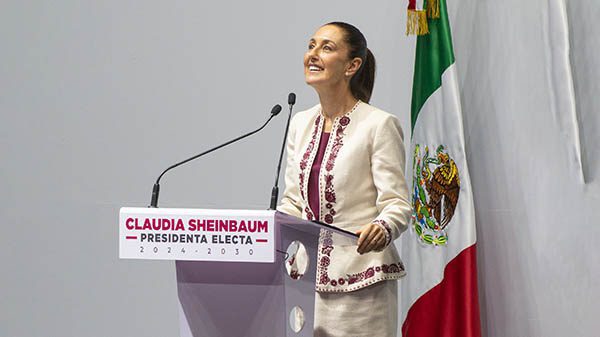Since the pandemic, many U.S. companies have moved manufacturing out of China and into Mexico. According to the U.S. Department of Commerce, U.S. companies expanding manufacturing and facilities in Mexico have invested over $25 billion. With a new Mexican president taking office in October, will investments in Mexico continue to grow?
Claudia Sheinbaum, the president-elect won in a landslide election in June. She will be sworn in on Oct. 1, 2024, as the first female president of Mexico. She is the prot├йg├й of former President Andres Obrador, and she has proposed sweeping judicial reforms and the elimination of several oversight organizations within the Mexican government.
At the Reshoring Institute, we are helping companies rethink their global supply chain strategies and this often includes moving at least some manufacturing to Mexico. The number one concern of these companies is crime in Mexico, particularly rampant cartel activity. Retiring President Obrador was criticized for not cracking down on the cartelsтАФwill Claudia Sheinbaum, his prot├йg├й, continue with the same policies in light of her promise to make judicial reforms? Or will she continue with a lighter policy on crime?
There is no doubt that the Mexican side of the border can be dangerous and a major concern for manufacturers shipping products to the U.S., and to the American executives traveling across the border. Conversely, a recently published study by the Reshoring Institute found that border towns such as San Diego, El Paso, Laredo, Brownsville, and others on the U.S. side have lower overall crime rates than national averages across America. You can find the complete study here: https://reshoringinstitute.org/reshoring-white-paper-crime-rates-at-the-u-s-mexico-border-concerns-for-nearshoring/
ScheinbaumтАЩs proposed constitutional amendments include eliminating government oversight and regulatory agencies, and the requirement for all Mexican judgesтАФincluding Supreme Court judgesтАФto be elected by popular vote. Several of the amendments appear to violate MexicoтАЩs obligations under the U.S. Mexico Canada Agreement (USMCA).┬а
The proposed changes to MexicoтАЩs judicial system could erode the checks and balances within MexicoтАЩs government, politicize judicial outcomes, undermine the rule of law, and result in higher levels of corruption throughout Mexico. Corruption in Mexico and the potential increase in crime is a high priority for manufacturers and investors when considering nearshoring manufacturing from a relatively safe environment in China, to Mexico.
What can we expect from the Sheinbaum administration for manufacturing?
SheinbaumтАЩs campaign promises included continuing to support the manufacturing sector and manufacturing ties to the U.S. She indicated her interest in┬аexpanding┬аtransportation infrastructure across the U.S.-Mexico border for increased economic developmentтАФessential for growth in manufacturing. In addition, she said she┬аsupported┬аthe creation of 100 industrial parks in Mexico to take advantage of the recent reshoring movement in the U.S.
But unless she addresses drug trafficking and other crime and corruption in Mexico, the growth of manufacturing in Mexico will be stunted.
If Kamala Harris is elected president in November, it will be a historical first to have women presidents in both the U.S. and Mexico. How would this change the relationship between the countries?┬а Stay tuned.
SC
MR
Source link : http://www.bing.com/news/apiclick.aspx?ref=FexRss&aid=&tid=66e9901d472e44fdae5a8083268c1f69&url=https%3A%2F%2Fwww.scmr.com%2Farticle%2Fwill-sheinbaum-president-mexico-help-or-hinder-manufacturing%2Fprocurement&c=5003942363049829545&mkt=en-us
Author :
Publish date : 2024-09-17 02:39:00
Copyright for syndicated content belongs to the linked Source.












